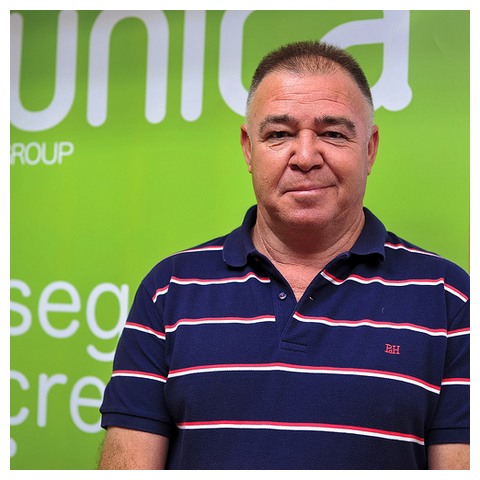Casur is one of the 6 groups of growers that market their produce underneath the structure and branding of The Unica Group, a group that mergers efforts of a total of 1500 growers in Almeria. Because José Martínez Portero is also the President of the Unica Group, the former grower can give an excellent overview of the group's capability and their ambitions. Martinez explained that their strategy is to expand in order to fulfill customer needs. Because supermarkets prefer growers who can deliver many products, it made sense for Unica and Casur to grow a diversity of crops.
 “We're of the mind that if we don't get bigger, then we're getting smaller,” said Martínez. “As our clients get bigger, they want more things, and they prefer to work with people who can provide them the many products they require.”
“We're of the mind that if we don't get bigger, then we're getting smaller,” said Martínez. “As our clients get bigger, they want more things, and they prefer to work with people who can provide them the many products they require.”Going bigger without loosing control
Casur is now an association with 570 employees with an annual turnover of 30 million euros. The Unica Group is producing 180 million kilos a year with a maximum daily output of three million kilos of produce. Going bigger and expanding can bring in the risk of loosing control. Martinez noted that his group and the cooperative have adapted a strict and tight protocol so they can keep an exact overview of what is happening inside the greenhouses.“Inside Casur, we have six technicians who go around to all of our growers and provide help,” said Martínez. “They personally visit every grower on a weekly basis to check on the status of their crops and offer advice on irrigation, crop protection, biological control, fertilization, growing techniques and harvesting.” "That level of assistance does not only gives Casur the possibility to claim that we grow on a sustainable and responsible way, but it also boosts productivity, which, in turn, positively impacts the bottom line."
Research & Development, Composting
"On the research and improvement side, we're working together with two other direct competitors in Almería to test different growing techniques and products,” said Martínez. Though it might seem odd to share information with competitors, he explained that the cooperation between rivals is mutually beneficial for all three companies, and given the many hurdles involved in bringing anything new to market Spain, it's necessary to use every advantage possible when it comes to research and development."This is also one of the reasons why we started our composting project," added Martinez. "We want to show our customers that we have a sustainable approach towards horticulture, and Almeria is growing responsible. We made a large investment and set up a program by ourselves to compost 100% of the crops leafs and stems. We have closed the chain by reusing all of the the compost in our greenhouses."
Staying local
In the last four years, Casur has doubled the number of growers in their organization. In addition to expanding their roster of growers, existing growers have also added growing capacity, further expanding both Unica's and Casur's size and output. But while Martínez is glad they're growing, he's also wary of moving too fast or going in the wrong direction. He mentioned Morocco as an example of a country in which many Spanish growers thought there was the potential to expand rapidly. While many growers started growing operations there on the basis of lower labor costs, Martínez noted that the situation there turned out to be much more complicated, so many of the growers he knew who went to Morocco are no longer in business there. For that reason, he prefers a more measured approach to growth and prefers to stay in the area around La Cañada, an area of constant sunshine and saline waters precious to tomatoes.“We will continue to expand,” said Martínez. “But I don't prefer a fast expansion, I prefer something that's slow and sure.” An area in which they are expanding is the organic side of the business. While Casur's growers practice residue-free growing, the majority of their growers use conventional growing techniques. While none of their conventional growers have switched over to organic growing, they have grown their organic side of the business by taking on new organic growers. But in any case, he thinks the difference between the two kinds of growers will become less important as the market demands produce with less of an environmental impact and standards merge conventional and organic growing techniques.
“Organic growing is more difficult right now,” said Martínez. “But in time, demand will be the same for both, and both kinds of growers will be in the same situation. Our customers are now already applying a zero-tolerance policy regarding maximum residue levels and as time goes by, less and less chemicals products will be available. This will even more increase the adaptation of biological crop protection and organic fertilizers inside conventional greenhouses, and on the other will make the difference between the two products very small.”
For more information:
UNICA: www.unicagroup.es
CASUR: www.casur.com/en
By Carlos Nunez and Boy de Nijs
